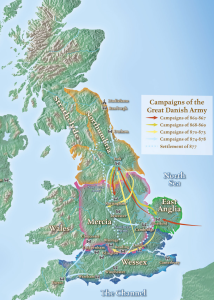King Alfred is the only English monarch to be known as “the Great.” His struggles and ultimate victory over the Danes ensured the survival of the Anglo-Saxon culture and the English language. In this episode, we explore the life of King Alfred and the historical events which led to the defeat of the Danes in Wessex. We also explore the history of certain words related to topography.
Podcast: Play in new window | Download
Subscribe: RSS


Some of this history is depicted on the television show The Last Kingdom.
Yes, I enjoyed that series. Though the storyline was fiction, it was based around actual events. I’m looking forward to the second season/series.
Hi Kevin. I’ve only just discovered your excellent podcasts and am enjoying them immensely.
I would like to offer one correction, if I may. King Edmund of the East Angles was, according to legend, killed by the the Vikings who used him as arrow target practice. He was buried in an East Anglican town that now bears his name – Bury St Edmunds. If you visit the town today you’ll see the ruins of the once great abbey that served as his shrine as well as contemporary statues representing Edmund’s martyrdom. I think it was actually Ella, king of the Northumbrians who, according to legend, suffered the blood eagle.
I’m very much looking forward to catching up on my listening.
Thanks. It has been a long time since I prepared this episode, so I don’t recall the specific resource I used for the story of Edmund receiving the blood eagle. Maybe I mixed up the two murders. Anyway thanks for the note, and I’m glad you’re enjoying the podcast!
Bury St. Edmunds.
I don’t think Kevin talked about the Bayeaux Tapestry but I believe it reflects the story of King Harold being killed by an arrow in his eye. The story is, of course, disputed. The Normans were descended from Vikings.
I was inspired to look up Ragnar Lodbrok and – oh boy, yuck – blood eagle. Wikipedia suggests that both might only have been literary creations. Phew! In the meantime, completely off topic, but you have mentioned at least twice the etymology of garlic = spear + leak: In Hungarian, the word is ‘fokhagyma’ = tooth + onion. As always, thank you very much for this informative & entertaining series.
Kevin, I just discovered your podcast a few weeks ago. My last listen was chapter 47″The Man Who Saved English.” I must say your podcast is one of the most addictive and informative that I’ve ever listened to. I listened to every episode of BBC. 4’s history of the world through 100 objects podcast series. It was good but as nothing compared to yours!
Not only am I learning a lot about the history of English and therefore Western Civilization but as a native Dutch speaker I’m learning a lot about my milk language as well!
Bravo sir! You richly deserve any success you realize from this endeavor. I will be adding my name( my real name that is) to your patreon list.
Thanks for the comments! I’m glad you’re enjoying the podcast.
Hi Nick,
An idle question: when you refer to Dutch as your “milk language,” is that a direct translation from Dutch? Certainly understandable in this context, but I am not aware of the “mother tongue” (which in my mind is the common expression for the language one learns at home) being referred to as such.
Thanks,
Bill
I’ve been enjoying your podcast during the Corona 19 shutdown. Makes a good companion while I knit.
I’d like to point out that you’ll also find -borough towns in Massachusetts. Marlborough, Southborough. While federal mapmakers changed it to “boro”, locals kept the full spelling. They also refused to change Centre to Center, so towns like Newton and Jamaica Plain (which is a subset of Boston) each have Centre Street, rather than Center Street, and there is a stop on the Green line in Newton called Newton Centre.
Hello- how many English speakers were left before Alfred won the war? I have heard only 300…thank you!
There were certainly more English speakers than that. Alfred was king during the early years of the Viking invasions, and thus, most people in England would have still spoken what we call ‘Old English’ today. Had the Vikings completed the conquest of England, the English language would have likely evolved in a completely different direction with much more Norse influence. Without a later Norman Conquest, it would have produced a language that would be unrecognizable to us today. But the language would have still been known as ‘English.’
An interesting side note with respect to the evolution of the word “cake”. In Yiddish (a Germanic language with roots in the 9th century) there’s delicious oven-baked dish called “kugel”.